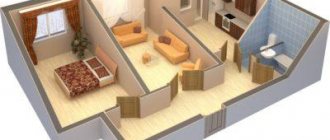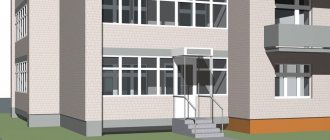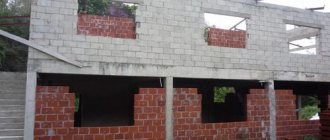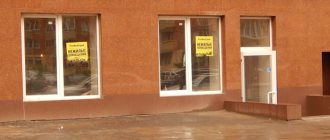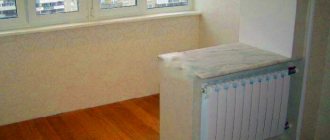There are often situations when citizens, trying to make their homes more modern and comfortable, do so in violation of the interests of their neighbors, creating a serious danger for all residents of the building.
Taking this into account, in the process of carrying out repair work in their own home, its owner must correctly understand what work can be carried out without prior approval, what repairs will require contacting government authorities, and what is prohibited in principle.
Dear readers! The article talks about typical ways to resolve legal issues, but each case is individual. If you want to find out how to solve your particular problem , contact a consultant:
8 (800) 700 95 53
APPLICATIONS AND CALLS ARE ACCEPTED 24/7 and 7 days a week.
It's fast and FREE !
Otherwise, the violator will be subject to liability and fines for illegal redevelopment of the apartment.
General provisions
In accordance with current legislation, the vast majority of work related to redevelopment must be pre-approved by government agencies, and the reasons for this can be very different and, first of all, this concerns the need to comply with certain standards and norms.
This is especially important if the repair work affects any engineering communications, since today there are often situations when, in the process of redevelopment, the owners do not first coordinate the completed project with specialized authorities, as a result of which any damage may occur. property in connection with changes to the design of load-bearing structures and other elements.
It is worth trying in every possible way to exclude such situations, especially considering the fact that quite serious liability is provided for this.
Who to complain to
If you are concerned about the construction of your neighbors below, mountains of construction waste, from an opening store on the ground floor, or if your interests as the owner of common property are affected (for example, on the top floor someone built an attic using the attic space), then you should complain to the appropriate authorities. You must write an application to the housing inspectorate of your area, which will be obliged to conduct an inspection upon your signal.
Changing the layout is an everyday matter if the structure of the house is not affected and there are no emergency consequences. It is enough to pay a fine and legitimize it. However, if done incorrectly, it can cause destruction that threatens all residents of the house. And even if it was carried out out of ignorance, then extremely sad consequences will follow.
Main provisions
First of all, you need to correctly understand what exactly is punishable by administrative fines today, and how the procedure for imposing it on the violator is carried out.
When a violation occurs
Any work related to making adjustments to the living space without obtaining prior permission is considered illegal redevelopment. In situations where obtaining it is not necessary in principle, repair work cannot be considered illegal, since their implementation does not imply a violation of current legislation.
Thus, redevelopment may be considered illegal when changes are made that should have been approved by the housing commission, but which were never formalized. Also recognized as such are repair work, which in principle is prohibited by current legislation, and if in the first case it is still possible to legitimize the adjustments made in court, in the second case the owner is invariably subject to quite serious responsibility, as well as the need to bring the housing to its original form.
In addition, liability is imposed on the owner even if he purchased an apartment in which illegal repair work was carried out, by inheritance or as a gift.
In the process of registering ownership during such operations, it is not at all necessary to provide a technical passport, and therefore the new owner may not even know that it does not contain any marks about the repairs carried out. At the same time, even if a person has already received pre-planned housing, all changes made will need to be legalized.
Sample permission for redevelopment of an apartment
Where and how to complain
Violation of the rules for the operation of residential premises is punishable in accordance with Article 23.55 of the Code of Administrative Responsibility. If neighbors have carried out illegal redevelopment, which potentially poses a safety threat to the building (for example, due to the repairs carried out, the building could, in principle, collapse), in order to protect their own rights, you can file a corresponding complaint with the housing inspectorate, drawing it up in any form.
It is worth noting the fact that in the process of filling out an application it is extremely important to indicate the key features of illegal redevelopment, as well as indicate the address of the neighbors, and the main part of the application must contain information about the violator and the reasons why his actions are considered illegal.
The final part of the application must include a requirement to bring the violator to appropriate liability with the subsequent elimination of the violation. A complaint can be sent to the authorized bodies by any means provided, from a personal visit to sending a registered letter via mail or a specialized website of the organization.
Based on the application received, the supervisory authority will be required to conduct an unscheduled inspection of compliance with housing legislation, as well as establish the existence of violations. If they are found, a case of administrative violation is initiated. At the same time, if the control body is inactive for any reason, you can file a complaint with the prosecutor’s office.
Sample statement of claim for redevelopment of an apartment:
Going to court
Judicial proceedings are carried out mainly only if the owner was unable to agree on the carrying out of repair work administratively. In this case, it is important to obtain a reasoned refusal from government officials, issued in writing, that is, the document must contain a reference to any norms or rules in accordance with which the procedure and technical nuances of redevelopment are regulated.
The filing of the statement of claim is carried out at the place of residence of the defendant, which will be local authorities, and in the document itself it is necessary to indicate the contact information and residential addresses of each of the parties to the conflict.
The plot of the application must describe the exact chronology of events, including the plaintiff’s attempts to independently resolve the problems associated with the redevelopment in a pre-trial manner. Along with the application, you will also need to submit other documents to the judicial authorities that confirm the accuracy of the information provided.
What is considered illegal redevelopment?
Redevelopment of a premises means making significant changes to its characteristics and configuration. For example, a two-room apartment is converted into a three- or one-room apartment.
This includes work on demolishing and moving partitions and load-bearing walls. Changing the location of the bathtub or toilet is also considered remodeling. All such actions must be previously agreed with the administration.
Changing the configuration of the premises must comply with the accepted standards of SanPiNs and SNiPs and other legal acts, including at the regional level. Otherwise, the redevelopment is considered illegal and the consequences of such actions can be severe.
The homeowner is prohibited from unauthorizedly performing the following work:
- removal of heating elements and pipelines to a loggia or balcony;
- demolition, moving load-bearing walls, which increases the load on other elements of the building;
- heating floor equipment and connecting it to the hot water supply system;
- moving the balcony, changing its shape and size;
- installation of additional walls and partitions to change the layout of the room;
- transferring a toilet, bathtub, plumbing equipment to places not intended for this;
- installation of new equipment, which is carried out with the transfer and change of utility systems;
- combining a living room and kitchen with a gas stove.
- measuring the shape and size of window openings.
Types of punishment and the amount of fines are fixed at the legislative level. The regulations indicate the specifics of the changes being made in the configuration of the premises, the reasons for carrying out major repairs, the necessary documents for coordination with local authorities, and the grounds for refusal.
The issues of apartment redevelopment are regulated by Articles No. 25-29 of the Housing Code of the Russian Federation. Additional rules for redevelopment are given in Decree of the Government of Russia No. 266 of April 28, 2005.
Emerging liability for illegal redevelopment
Carrying out illegal redevelopment involves imposing liability on the violator in the form of a fine, and local authorities also have the right to demand that the owner restore the housing to its previous condition.
If the owner refuses to carry out restoration work, he may be brought to court proceedings, on the basis of which his housing may be sold through a public auction.
Among other things, do not forget that based on the fact of illegal redevelopment, a social tenancy agreement with a person can be terminated.
What exactly will help you change the space of your home, redevelopment or reconstruction - specialists will help you with this. We will explain what redevelopment of residential premises may include.
Other problems
In addition to the specified nuances of illegal redevelopment, it is also worth considering a number of other, no less important features.
What and when does it threaten?
Violation of the current legislation related to redevelopment provides for the possibility of imposing the following types of punishment on the violator. First of all, a fine is imposed, the amount of which can range from 1,500 to 2,500 rubles, depending on the circumstances.
In addition, there is also administrative responsibility, which is imposed in accordance with Part 5 of Article No. 290 of the Housing Code. If the fine is not paid and other instructions of government bodies are not met, the housing is confiscated from the owner and sold at public auction.
If you don't pay
Of course, the ideal solution after being found guilty of violating the current administrative legislation would be to pay the imposed fine for carrying out unauthorized redevelopment, while simultaneously legalizing or eliminating the repairs carried out.
Failure to pay within the deadlines that were established for the voluntary fulfillment of the assigned obligations provides for further forced execution by the authorized bailiff service, which can:
- seize property;
- seize a vehicle when interacting with the traffic police;
- prohibit the possibility of traveling outside Russia.
As mentioned above, deliberate evasion of the imposed obligations to collect a fine for illegal redevelopment and its failure to pay can result in quite serious consequences, and in exceptional cases this can lead to actual deprivation of housing. Among other things, if, due to repairs, the building collapses, a person dies, or any other accidents occur, the culprit may even end up in the dock.
Sample application for redevelopment of residential premises:
Other situations
For persistent violators, a sanction is provided in the form of deprivation of the right to use real estate, and this applies not only to owners, but also to tenants. In this case, the municipality completely terminates the previously executed rental agreement with the tenant, while the owner’s housing is taken away and sold at auction.
Part 5 of Article 29 of the Housing Code provides for the possibility, in court, at the initiative of representatives of the housing inspection, to deprive a person of the right of ownership of certain housing, and after its sale, a certain part of the proceeds goes to cover the relevant legal costs and restore the original appearance of the property, while while the remaining amount is returned to the former owner.
Article 29. Consequences of unauthorized reconstruction and (or) unauthorized redevelopment of residential premises
What work is considered illegal?
Anyone who changes the space of the premises without permission, except in cases where approval is not required. We have listed the main types above. Unauthorized redevelopment of an apartment will be considered illegal if:
- the changes have not been agreed upon (it is possible to legalize unauthorized work after its completion, albeit with the payment of a fine);
- repair work prohibited by law was carried out. For example, dangerous manipulations with a load-bearing wall (you will have to pay a fine and restore the premises).
The owner's liability extends even to those cases when he received property that has already undergone illegal redevelopment, under a gift agreement or by inheritance.
In these cases, ownership is usually issued without a technical passport, so the owner often does not even know whether there is a mark on the changes, or whether they were carried out at all. What cannot be done categorically and what changes will not be legalized:
- move the bathrooms to another place, under which there is a living room on the lower floor;
- expand the kitchen and bathroom, and reduce the area of the room. You also cannot move the kitchen into the room and combine the bathroom with the room (this trend has appeared in modern interiors);
- change water and gas disposal systems, hide and wall up these pipes, move heating radiators to loggias;
- make windows and doors in load-bearing walls yourself;
- demolish load-bearing walls;
- combine living space with an attic;
- combine a balcony with a room;
- cover the balcony slabs through which fire escapes pass.
In any case, if you decide to redevelop a non-residential premises and are not completely sure whether these actions are permitted, you need to coordinate them with the relevant authorities. It is definitely possible without approval: change the battery, install an air conditioner, install a new built-in wardrobe.
How to solve a problem
In order not to get bogged down in lengthy legal proceedings with representatives of the BTI, and also not to pay the maximum amount of the fine, it is best to immediately begin the procedure for legitimizing the redevelopment.
If the repair work was carried out in full compliance with established standards and without any violations, it will be possible to coordinate their implementation in a fairly short time, since you will only need to collect all the necessary documents and submit an appeal to the authorized bodies so that they make a decision and issue appropriate permission.
Also, do not forget that after receiving this document you will need to change the existing technical passport to a more current one so that all the relevant changes are made to it.
In practice, situations occur more often when people carry out independent repairs with numerous violations, and therefore it is simply impossible for them to obtain permission.
